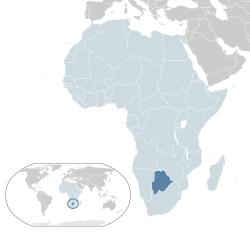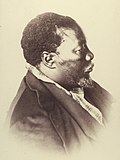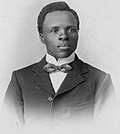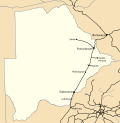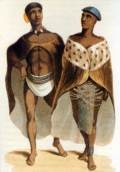Portal:Botswana
Intro
Botswana, officially the Republic of Botswana, is a landlocked country in Southern Africa. Botswana is topographically flat, with approximately 70 per cent of its territory part of the Kalahari Desert. It is bordered by South Africa to the south and southeast, Namibia to the west and north, Zambia to the north, and Zimbabwe to the northeast. With a population of slightly over 2.4 million people and a comparable land area to France, Botswana is one of the most sparsely populated countries in the world. It is essentially the nation-state of the Tswana people, who constitute nearly 80 per cent of the population. The Tswana ethnic group are descended mainly from Bantu-speaking peoples who migrated into southern Africa, including modern Botswana, in several waves before AD 600. In 1885, the British colonised the area and declared a protectorate named Bechuanaland. As part of the decolonisation of Africa, Bechuanaland became an independent Commonwealth republic under its current name on 30 September 1966. Since then, it has been a parliamentary republic with a consistent record of uninterrupted democratic elections, though dominated by the Botswana Democratic Party until 2024. As of 2024[update], Botswana is the least corrupt country in mainland Africa according to the Corruption Perceptions Index published by Transparency International. Botswana's economy has generally experienced stable growth since independence. It is dominated by tourism and mining; Botswana produces more diamonds than any other country. Its gross national income per capita (purchasing power parity) of about $20,158 as of 2024[update] (by some estimates the fourth-largest in Africa) gives the country a relatively high standard of living and the second-highest Human Development Index of continental Sub-Saharan Africa, after South Africa. Despite this, Botswana continues to grapple with high unemployment rates. Botswana is a member of the Southern African Customs Union, the Southern African Development Community, the Commonwealth of Nations and the United Nations. (Full article...)
Selected article - Batswana nationality law is regulated by the 1966 Constitution of Botswana, as amended; the Citizenship Act 1998, and its revisions; and international agreements entered into by the government of Botswana. These laws determine who is, or is eligible to be, a national of Botswana. The legal means to acquire nationality, formal legal membership in a nation, differ from the domestic relationship of rights and obligations between a national and the nation, known as citizenship. The Botswana nationality is typically obtained on the principle of jus sanguinis, i.e. by birth to parents with Botswana nationality. It can be granted to persons who have lived in the country for a specific period of time, who have performed distinguished service to the nation or who have an affiliation to the country through naturalisation. (Full article...) Did you know -
This is a good article, A-class article, featured list, or featured article, one of Wikipedia’s best work.
Zebras (US: /ˈziːbrəz/, UK: /ˈzɛbrəz, ˈziː-/) (subgenus Hippotigris) are African equines with distinctive black-and-white striped coats. There are three living species: Grévy's zebra (Equus grevyi), the plains zebra (E. quagga), and the mountain zebra (E. zebra). Zebras share the genus Equus with horses and asses, the three groups being the only living members of the family Equidae. Zebra stripes come in different patterns, unique to each individual. Several theories have been proposed for the function of these patterns, with most evidence supporting them as a deterrent for biting flies. Zebras inhabit eastern and southern Africa and can be found in a variety of habitats such as savannahs, grasslands, woodlands, shrublands, and mountainous areas. Zebras are primarily grazers and can subsist on lower-quality vegetation. They are preyed on mainly by lions, and typically flee when threatened but also bite and kick. Zebra species differ in social behaviour, with plains and mountain zebra living in stable harems consisting of an adult male or stallion, several adult females or mares, and their young or foals; while Grévy's zebra live alone or in loosely associated herds. In harem-holding species, adult females mate only with their harem stallion, while male Grévy's zebras establish territories which attract females and the species is polygynandrous. Zebras communicate with various vocalisations, body postures and facial expressions. Social grooming strengthens social bonds in plains and mountain zebras. (Full article...) General images -The following are images from various Botswana-related articles on Wikipedia.
Related portalsOther South African countriesReligion in BotswanaBotswana-related articlesCategoriesAssociated WikimediaThe following Wikimedia Foundation sister projects provide more on this subject:
| |||||||||||||||||



